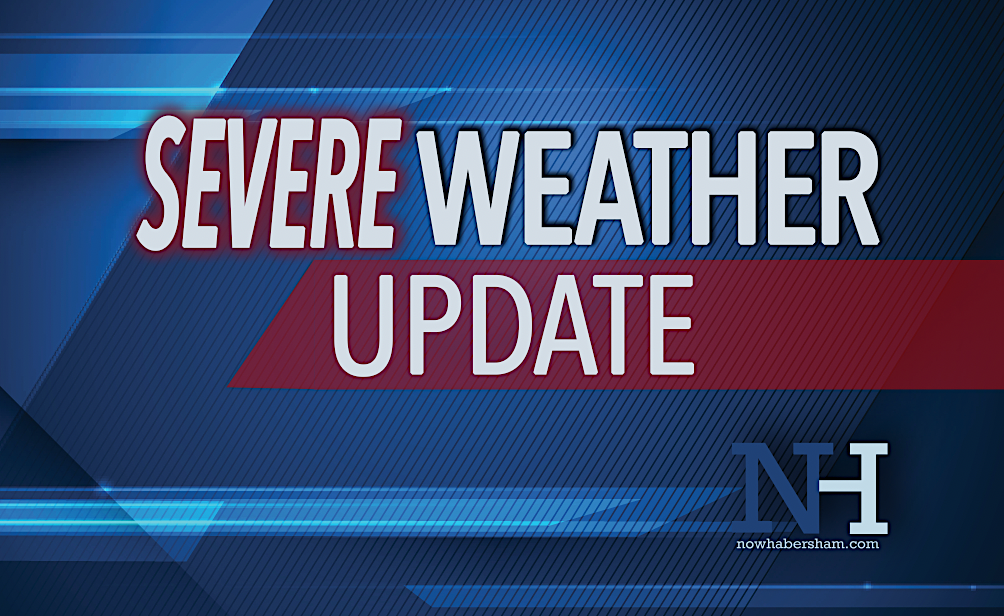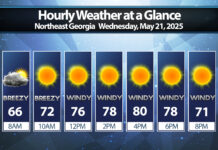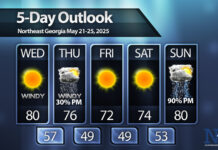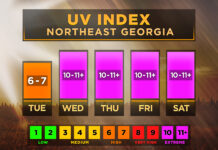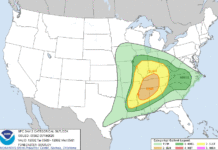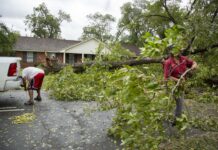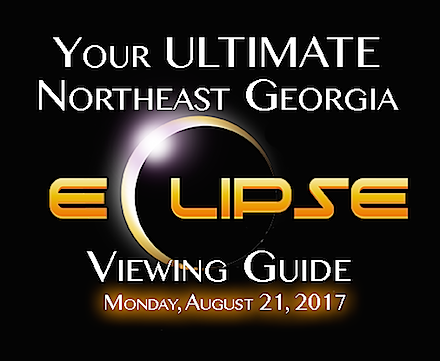
Everything you wanted to know but were too afraid to ask about the 2017 Solar Eclipse.
If you haven’t already, be sure to check out our earlier post about the 2017 solar eclipse which contains general information about solar eclipses. In this update I will be focusing on the technical information to help you prepare for and pick out a location to view the eclipse.
Preparedness
Tens of thousands of people are expected to visit North Georgia for this event, so it is extremely important to be prepared. Emergency Management Agencies across the country are treating this event like a natural disaster due to the massive influx of people into the path of totality. So, what problems may we experience and what can you do to prepare?
TRAFFIC: Traffic is going to be horrible. If the weather is nice (an increasingly likely possibility), we’ll see tens of thousands or more people traveling north from Atlanta into the path of totality, with the majority of those people coming at some point through Habersham County. This will lead to extremely heavy traffic and major backups along major roads, primarily US441 and US76.
RELATED: Great American Eclipse forecast
If you plan to travel on this day, or the Sunday before or Tuesday after, I strongly advise having extra food and water in the car. Be sure to bring ALL necessary medications in the event you spend several hours stuck in traffic. Be sure to have a full tank of gas before heading out, and have a first aid kit handy.
If you don’t plan to travel, be sure to follow all the above steps anyways in case you have an emergency and need to. Keep in mind that in the case of major traffic backups ambulances and other emergency services may take longer to reach their destinations.
For more information regarding expectations and requests from the Georgia DOT, please check out this article.
In addition, the US Forest Service will be closing some forest service roads on the day of the eclipse. These roads are FS11 (Glassy Mountain past Apple Gap Road), FS62 (Curahee Mountain) and FS413 (Rabun Bald). If you plan to hike at all during this event, the Forest Service recommends having a detailed map and compass, along with plenty of water. Do NOT block any roads and make sure to pull completely off the side if you plan to park somewhere. You can view their entire press release here.
CELL SERVICE: With the major influx of people, it is highly likely that cell service will be much slower than usual on the day of the eclipse in the areas of totality. If you are heading out for the eclipse make sure someone knows where you are and a rough estimate of a return time. Cell phone providers do have plans to handle this load and this may not become a problem, but the potential is there.
WATCHING: For watching the eclipse, you’ll want either a pair of eclipse glasses, which we will have at our event in Clarkesville, or a pinhole projector. Pinhole projectors are extremely simple devices that project an image of the sun onto a surface. Simply take a paper plate and poke a tiny hole in the middle and allow the sun to shine through the hole onto a surface. Taping a small piece of aluminum foil with a pinhole in it over the plate then poking the hole can make it a bit clearer. The projected image will show the crescent of the sun as the eclipse progresses. You can also look at shadows of leaves and use any items with small holes (ritz crackers, strainers, etc) to accomplish this effect. We will have 2,000 pairs of eclipse glasses available on a first come, first serve basis at our event at Pitts Park, so if you don’t have any be sure to come out early!
READ: Warning issued about fake solar eclipse glasses and viewers
TECHNICAL INFORMATION
So, now that you are prepared, where should you watch the eclipse? I recommend coming to our event Total Eclipse of the Park at Pitts Park in Clarkesville, but if you don’t want to travel far or want to know how long totality will last in your town, check out my list down below of what to expect from each location. I’ve arranged them in alphabetical order to make it easier to sift through. These times are for the “downtown” areas of the cities below, and totality times will drop as you head south and go up as you head north from these locations. You’ll likely want at least 30 seconds of totality to fully enjoy the event, with 1 minute or more definitely something within reach for most of our area. The time format is H:MM:SS for the duration of totality. For more location about your specific address visit this interactive map courtesy of NASA.
ALTO: The sun will be 99.99% covered at peak but will not enter totality. The eclipse will begin at 1:06PM and end at 4:01PM, with maximum coverage at 2:37PM.
BALDWIN: The sun will be 100% covered at peak with 43.6 seconds of totality. The eclipse begins at 1:07PM and ends at 4:01PM. Totality will last from 2:37:01PM to 2:37:45PM.
BLAIRSVILLE: The sun will be 100% covered at peak with 1m 58.1s of totality. The eclipse begins at 1:05PM and ends at 4:00PM. Totality will last from 2:34:58PM to 2:36:56PM.
BLUE RIDGE: The sun will be 100% covered at peak with 36.3 seconds of totality. The eclipse begins at 1:04PM and ends at 4:00PM. Totality will last from 2:34:56PM to 2:35:33PM.
CARNESVILLE: The sun will be 100% covered at peak with 59.5s of totality. The eclipse begins at 1:07PM and ends at 4:02PM. Totality will last from 2:37:40PM to 2:38:40PM.
CLARKESVILLE: The sun will be 100% covered at peak with 1m 45s of totality at Pitts Park. The eclipse begins at 1:06PM and ends at 4:01PM. Totality will last from 2:36:20PM to 2:38:06PM.
CLAYTON: The sun will be 100% covered at peak with 2m 34.7s of totality. The eclipse begins at 1:06PM and ends at 4:01PM. Totality will last from 2:35:48PM to 2:38:22PM.
CLEVELAND: The sun will be 100% covered at peak with 38.4s of totality. The eclipse begins at 1:06PM and ends at 4:01PM. Totality will last from 2:36:27PM to 2:37:05PM.
CLERMONT: The sun will be 99.87% covered and will not enter totality. The eclipse begins at 1:06PM and ends at 4:01PM. Maximum coverage will occur at 2:36:56PM.
COMMERCE: The sun will be 99.63% covered and will not enter totality. The eclipse begins at 1:07PM and ends at 4:02PM. Maximum coverage will occur at 2:37:59PM.
CORNELIA: The sun will be 100% covered at peak with 1 minute and 1 second of totality. The eclipse begins at 1:07PM and ends at 4:01PM. Totality will last from 2:36:52PM to 2:37:53PM.
CUMMING: The sun will be 98.78% covered at peak and will not enter totality. The eclipse begins at 1:05PM and ends at 4:01PM. Maximum coverage will occur at 2:36:35PM.
CLAYTON: The sun will be 100% covered at peak with 2m 34.7s of totality. The eclipse begins at 1:05PM and ends at 4:01PM. Totality will last from 2:35:48PM to 2:38:22PM
DAHLONEGA: The sun will be 99.78% covered at peak and will not enter totality. The eclipse begins at 1:05PM and ends at 4:01PM. Maximum coverage will occur at 2:36:26PM.
DAWSONVILLE: The sun will be 99.39% covered at peak and will not enter totality. The eclipse begins at 1:05PM and ends at 4:01PM. Maximum coverage will occur at 2:36:19PM.
DILLARD: The sun will be 100% covered at peak with 2m 37.9s of totality. The eclipse begins at 1:06PM and ends at 4:01PM. Totality will last from 2:35:40PM to 2:38:18PM.
DEMOREST: The sun will be 100% covered at peak with 1m 23.7s of totality. The eclipse begins at 1:07PM and ends at 4:01PM. Totality will last from 2:36:34pM to 2:37:57PM.
FRANKLIN SPRINGS: The sun will be 100% covered with only 22.9s of totality. The eclipse begins at 1:08PM and ends at 4:02PM. Totality will last from 2:38:18PM to 2:38:41PM.
GAINESVILLE: The sun will be 99.43% covered and will not enter totality. The eclipse begins at 1:06PM and ends at 4:01PM. Maximum coverage will occur at 2:37:05PM.
HARTWELL: The sun will be 100% covered at peak with 1m 52.0s of totality. The eclipse begins at 1:08PM and ends at 4:03PM. Totality will last from 2:37:52PM to 2:39:44PM.
HELEN: The sun will be 100% covered at peak with 1m 41.8s of totality. The eclipse begins at 1:06PM and ends at 4:01PM. Totality will last from 2:35:50PM to 2:37:32PM.
HIAWASSEE: The sun will be 100% covered at peak with 2m 26.7s of totality. The eclipse begins at 1:06PM and ends at 4:00PM. Totality will last from 2:35:02PM to 2:37:29PM.
HOMER: The sun will be 99.86% covered and will not enter totality. The eclipse begins at 1:07PM and ends at 4:02PM. Maximum coverage will occur at 2:37:42PM.
LAVONIA: The sun will be 100% covered at peak with 1m 51.5s of totality. The eclipse begins at 1:08PM and ends at 4:02PM. Totality will last from 2:37:24PM to 2:39:16PM.
MARTIN: The sun will be 100% covered at peak with 1m 55.5s of totality. The eclipse begins at 1:07PM and ends at 4:02PM. Totality will last from 2:37:08PM to 2:39:04PM.
MINERAL BLUFF: The sun will be 100% covered at peak with 1m 23.6s of totality. The eclipse begins at 1:04PM and ends at 4:00PM. Totality will last from 2:34:34PM to 2:35:58PM.
MT. AIRY: The sun will be 100% covered at peak with 1m 12.6s of totality. The eclipse will begin at 1:07PM and end at 4:01PM. Totality will last from 2:36:49PM to 2:38:01PM.
PINE MOUNTAIN: The sun will be 100% covered at peak with 2m 37.6s of totality. The eclipse begins at 1:07PM and ends at 4:01PM. Totality will last from 2:36:06PM to 2:38:44PM.
SKY VALLEY: The sun will be 100% covered at pea with 2m 38.0s of totality. This is the longest totality of any city in the state, with Dillard being a close second. The eclipse begins at 1:07PM and ends at 4:01PM. Totality will last from 2:35:45PM to 2:38:23PM.
SUCHES: The sun will be 99.99% covered but will not enter totality. The eclipse begins at 1:05PM and ends at 4:00PM. Maximum coverage will occur at 2:36:07PM.
TALLULAH FALLS: The sun will be 100% covered with 2m 21.6s of totality. The eclipse begins at 1:07PM and ends at 4:01PM. Totality will last from 2:36:09PM to 2:38:30PM.
TOCCOA: The sun will be 100% covered with 1m 59.5s of totality. The eclipse begins at 1:07PM and ends at 4:02PM. Totality will last from 2:36:40PM to 2:38:40PM.
YOUNG HARRIS: The sun will be 100% covered with 2m 19.3s of totality. The eclipse begins at 1:05PM and ends at 4:00PM. Totality will last from 2:34:57PM to 2:37:16PM.
Stay with Now Habersham for the latest on eclipse weather forecasts and other information.


